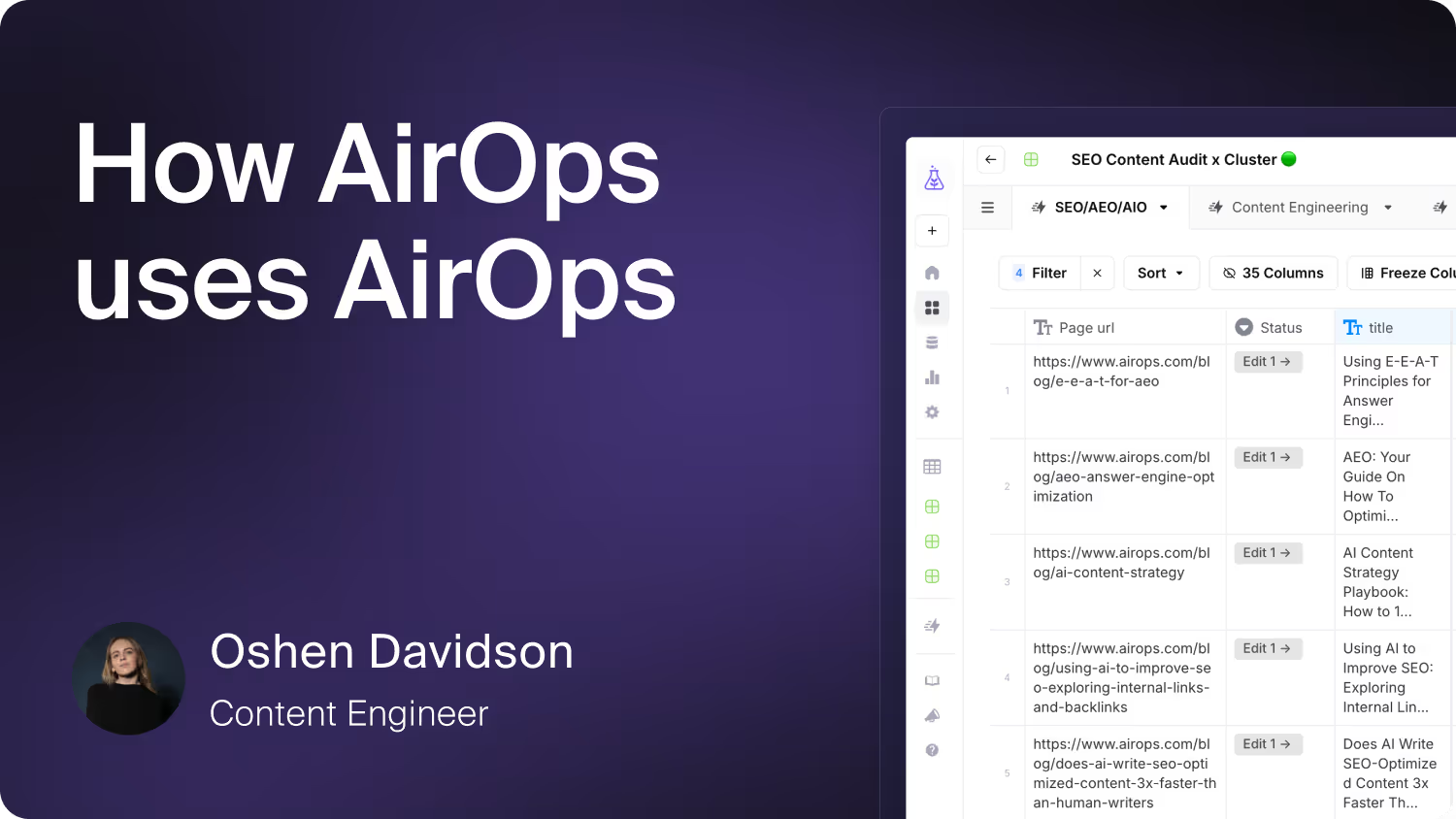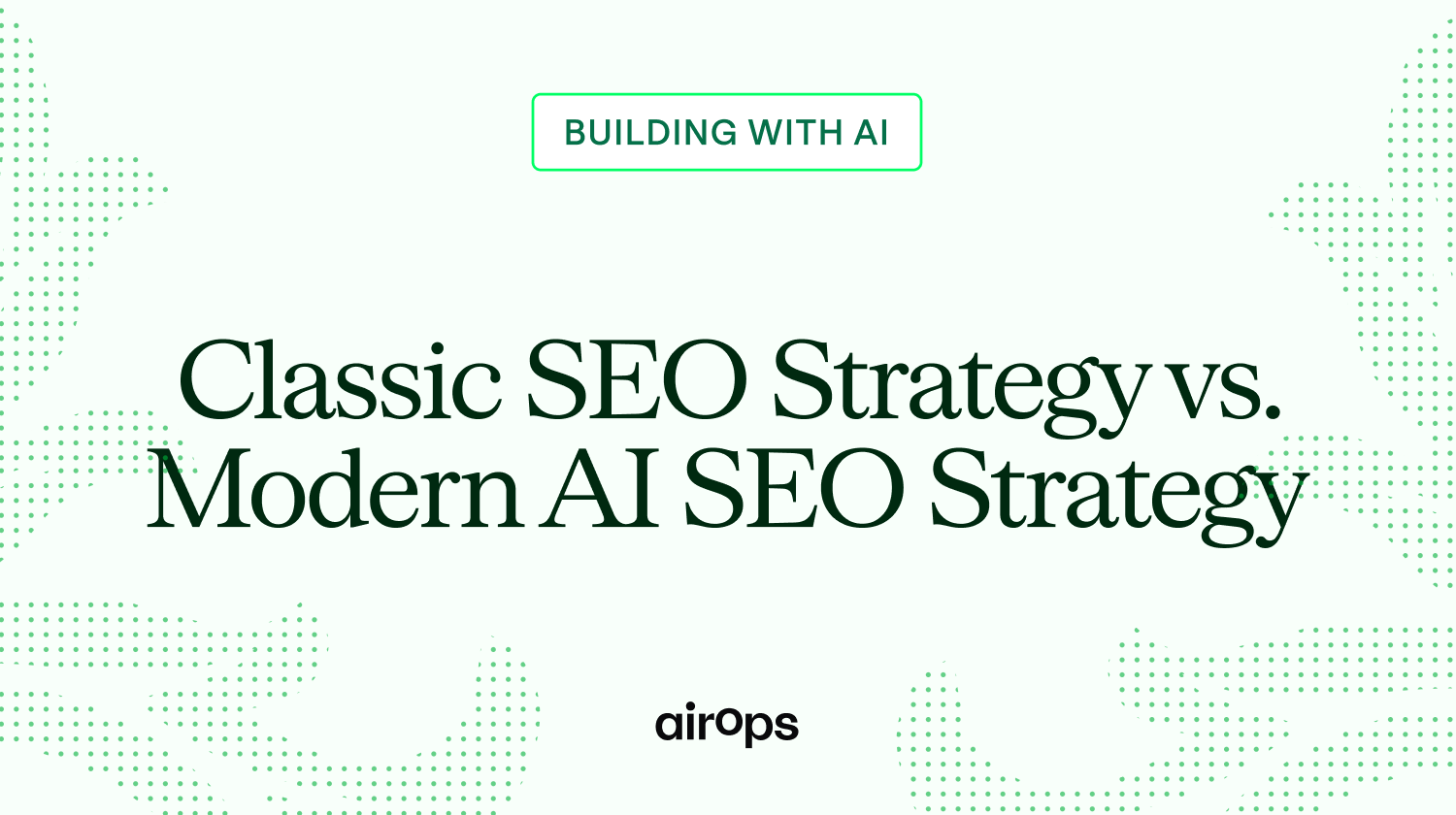Can AI Content Rank in Google?

AI-generated content can rank in Google if it meets high standards for expertise, accuracy, and user value.
Google evaluates content quality and usefulness, not the method of creation—combine AI efficiency with human editing, fact-checking, and brand insights for best results.
Learn how Google evaluates AI-generated content—and how to create content that demonstrates E-E-A-T and Google's people-first content guidelines.
AI tools have transformed how content is created—enabling teams to produce blogs, landing pages, and knowledge base articles faster than ever.
But as generative large language models like ChatGPT, Claude, and Gemini become part of the content workflow, one critical question remains:
Does AI-generated content rank in Google Search?
The answer isn’t black and white. While Google has issued statements, updated its spam policies, and fine-tuned systems like SpamBrain to detect AI-generated content, the distinction between acceptable automation and manipulative publishing practices remains nuanced.
Can Google Detect AI-Generated Content?
Google has the ability to detect AI-generated content using advanced machine learning systems. However, detection alone does not determine whether content ranks well in search results.
The key question isn’t whether Google can detect AI content—it’s whether the content meets Google’s standards for quality, originality, and usefulness.
How Does Google Detect AI-Generated Content?
Google uses systems like SpamBrain to identify low-quality, manipulative, or spammy content, regardless of whether it’s created by humans or AI.
These systems evaluate:
Content patterns and repetition
Behavioral and link signals
Signs of mass automation without added value
Does Google Penalize AI Content?
Content generated with AI is not automatically penalized. Google's detection systems like SpamBrain aim to surface helpful, original, people-first content, regardless of whether it’s written by a machine or a human.
According to Google Search Central, “Using automation—including AI—to generate content with the primary purpose of manipulating ranking in search results is a violation of our spam policies.”
Can AI-Generated Content Rank in Google?
Yes. AI-generated content can rank well in Google search results if it demonstrates high quality, originality, and relevance to user intent.
Google has confirmed that it''s ranking systems rewards content based on the content quality, and value to the user, not the tool used to create it.
To be effective, AI-assisted content must go beyond generic outputs and be created with the intent to inform or serve the user—not to manipulate rankings.
What Google Prioritizes in Ranking
Google ranks content based on its usefulness, trustworthiness, and alignment with user needs. All content—whether AI-generated or human-written—must meet the same core quality standards.
Google's Key Ranking Signals Include:
E-E-A-T (Experience, Expertise, Authoritativeness, Trustworthiness): Content should demonstrate real-world experience and subject matter knowledge, supported by credible sources and expert input.
Alignment with search intent: The format, tone, and depth must match what users are actually searching for—whether informational, transactional, or navigational.
Originality and depth: Content should offer unique insights, data, or perspectives beyond what’s already widely available or easily replicated.
Factual accuracy and clarity: In YMYL (Your Money or Your Life) topics—such as health, finance, or safety—Google expects high levels of factual precision, transparency, and plain language. While not always mandatory, Google recommends disclosing the use of automation in sensitive domains to maintain trust and editorial integrity.
When these standards are met—and when human review enhances AI output—AI-generated content can outperform traditional content in both rankings and engagement.
Best Practices for Ranking AI-Generated Content in Google
AI tools can accelerate content creation, but ranking in Google requires more than just automation. To ensure your content meets Google’s quality standards, follow these best practices that combine AI efficiency with human editorial oversight.
1. Use AI for Drafting, Not Publishing
AI excels at generating first drafts quickly, especially when prompted with clear inputs like target audience, tone, and content structure.
Start with structured prompts tailored to your topic and format.
Use AI to outline subtopics, generate variations, or explore angles—not to publish unedited copy.
2. Apply Human Editing for Accuracy and Tone
AI content often lacks nuance and context, which can often result in generated AI slop. Human editors are essential to ensure the output is factually correct, on-brand, and clearly written.
Refine grammar, voice, and clarity using tools like Grammarly or Hemingway.
Ensure consistency with brand tone, terminology, and messaging.
3. Fact-Check All Key Claims
When using AI, large language models may hallucinate or reference outdated or incorrect data. Always verify important facts using credible sources.
Prioritize citations from .gov, .edu, peer-reviewed journals, or trusted news and industry organizations.
Cross-check data points, statistics, and brand mentions with primary sources.
4. Embed Subject Matter Expertise
AI-generated content often lacks the depth required to demonstrate real authority. Add human insight to boost credibility and meet E-E-A-T standards.
Include original commentary from subject matter experts (SMEs).
Add case studies, first-party data, or industry-specific examples.
5. Create People-First Content
Google prioritizes content that is created primarily to help users—not to manipulate search rankings. AI-generated content must demonstrate a clear focus on user value.
According to Google’s helpful content guidelines, high-performing content should:
Clearly answer a specific question or solve a real problem
Demonstrate first-hand experience or deep knowledge of the topic
Avoid clickbait headlines or over-promising
Be written for a human audience—not for search engines
Prioritize creating people-first content by:
Starting with user questions and pain points, and not keywords alone
Use AI to assist—but apply editorial judgment to ensure clarity, empathy, and usefulness
Evaluate your content against Google’s “people-first” checklist before publishing
5. Align with Search Intent
High-performing content matches what users are actually looking for—both in format and depth.
Use tools like Google Search, Ahrefs, or Semrush to analyze top-ranking pages for your keyword.
Tailor content type (e.g., how-to, list, comparison) to the dominant intent: informational, commercial, transactional, or navigational.
6. Structure Content for Search and Readability
Google and users both prefer semantically structured, easy-to-scan content.
Use clear H1–H3 headings, bullets, and short paragraphs.
Embed visual elements like charts or images to break up text.
Where applicable, implement schema markup (e.g., HowTo, FAQ) to enhance visibility in search results.
How Much AI-Generated Content is Acceptable for SEO?
There is no fixed percentage of AI-generated content that is considered “safe” or “acceptable” by Google.
Instead of measuring how much content is written by AI, Google evaluates whether each page is genuinely helpful, accurate, and aligned with search intent.
The key question is not “How much AI is too much?”—but rather: Does the content meet Google’s quality standards, regardless of how it was created?
How to Ensure Your AI Content Meets Google’s SEO Standards
By the time your AI-assisted content is ready for publishing, it should meet the same quality benchmarks as any human-written page. That means demonstrating expertise, intent alignment, originality, and trustworthiness.
Use this diagnostic checklist to review your content before it goes live. It’s designed to help teams catch weak points early—ensuring your content satisfies both search engine standards and user expectations.
AI Content Diagnostic Checklist
Use this framework as a final review before publishing AI-assisted content. It’s organized around five core quality pillars aligned with Google’s high-quality content guidelines.
1. Accuracy & Expertise
Verify all facts and demonstrate subject matter authority.
Are all claims and data points verified with authoritative sources (.gov, .edu, peer-reviewed, or trusted orgs)?
Does the content reflect subject matter expertise or first-hand experience to demonstrate credibility?
Is high-stakes information—such as health, legal, or financial advice—accurate, current, and clearly explained?
2. Intent & Usefulness
Align the content with what users are actually trying to achieve.
Does the content align with the user's search intent (e.g., how-to, informational, commercial)?
Is the content answering the user query directly?
Does the content offer clear, relevant information that helps the user take action or make a decision?
3. Originality & Value
Go beyond what's already published by adding unique insights.
Does the content provide new value—not just summarize what’s already available?
Does the content contain original research, case studies, or first-party data?
Does the content offer fresh perspectives or deeper context on the topic that isn't already covered by competitors?
4. Structure & Readability
Present content in a clear, scannable format that makes it easy for users and search engines to navigate, read and understand.
Does the content use clear, descriptive headings (H1–H3) that reflect its structure and match the query?
Are bullet points, spacing, and short paragraphs used to improve readability?
Are key answers or definitions placed near the top for quick scanning and AI summarization?
Is the content organized in a logical order with a clear visual hierarchy?
5. Brand & Trust Signals
Reinforce credibility and ensure alignment with your brand voice.
Is the tone consistent with your brand’s editorial standards and audience expectations?
Does the page include author bylines, credentials, or a publication/update date where appropriate?
Would the content inspire confidence if viewed by a skeptical or first-time visitor?
6. Final Check:
Before you publish the content, ask yourself:
Would I be confident citing this content as a trustworthy source?
Does it offer more value or insight than competing pages in the SERP?
Would a real user find this content helpful, credible, and relevant?
How High-Performing Teams Use AI to Meet Google's Content Standards
High-performing content teams use AI strategically—not just to scale output, but to ensure every piece of content aligns with Google’s expectations for quality, intent, and originality.
According to McKinsey's 2025 State of AI Report, 27% of organizations manually review all AI-generated content before publishing—a signal that oversight is becoming a standard part of responsible AI workflows.
This reflects a growing industry standard: while AI can accelerate content creation, editorial oversight is essential for maintaining trust and achieving search performance.
Teams that succeed with AI use workflows designed to meet Google's quality signals:
They start with search intent—identifying user queries, SERP formats, and content expectations before drafting.
They generate first drafts with structured prompts that include topic, audience, tone, and metadata needs.
They review AI content for factual accuracy, brand voice, and structure using checklists and editorial processes.
They layer in expert insights, original data, and references to demonstrate E-E-A-T and differentiate from generic outputs.
This “human-in-the-loop” model balances efficiency with editorial quality—ensuring AI-assisted content meets the same standards as high-performing, human-written pages.
Case Study: How Deepgram Scaled SEO with AI and Human Oversight
Deepgram successfully scaled content production using a hybrid approach—pairing AI-assisted research and drafting with expert human review. According to GrowthMode, they increased organic traffic 20x in 12 months by:
Targeting technical, high-intent search queries
Using AI to accelerate topic research and draft content
Refining each piece with subject matter expertise and editorial review
This approach reflects what leading teams are doing successfully: using AI to accelerate content production, while relying on human oversight to ensure accuracy, originality, and alignment with Google's quality content benchmarks.
Creating AI Content That Ranks in Google
Google ranks content based on quality, not authorship. That means AI-generated content can rank—if it’s created to serve users, not manipulate algorithms.
To perform well in Google search, content must clearly address user intent, be factually accurate, and offer original value.
Simply generating text with AI isn’t enough.
What sets high-performing content apart is the addition of expert insight, clear structure, editorial judgment, and human oversight.
How AirOps Helps You Create AI Content That Ranks
AirOps helps content teams generate AI-assisted content that meets Google’s ranking standards—without sacrificing quality, structure, or trust.
With AI workflows purpose-built for search performance, AirOps enables teams to:
Research user intent and align content to real search queries by using pre-built Power Agents, SERP analysis, and query-based content frameworks to ensure every piece maps to what users are actually looking for.
Structure content for clarity and scanability by generating semantically organized drafts with optimized H1–H3 headings, bullets, FAQs, and schema-ready formatting that improves both readability and ranking.
Demonstrate E-E-A-T with embedded expertise and oversight by integrating brand knowledge, Knowledge Bases, SME quotes, citations from trusted sources, and human review into every workflow
Deliver original, high-value content at scale by combining workflows with company-specific data, first-party insights, and use-case-driven variations to avoid generic outputs and stand out in competitive SERPs.
Ready to create high-quality, AI-assisted content that earns visibility in Google?
Book a strategy session to see how AirOps can help.
Win AI Search.
Increase brand visibility across AI search and Google with the only platform taking you from insights to action.
Get the latest on AI content & marketing
Get the latest in growth and AI workflows delivered to your inbox each week
.avif)





